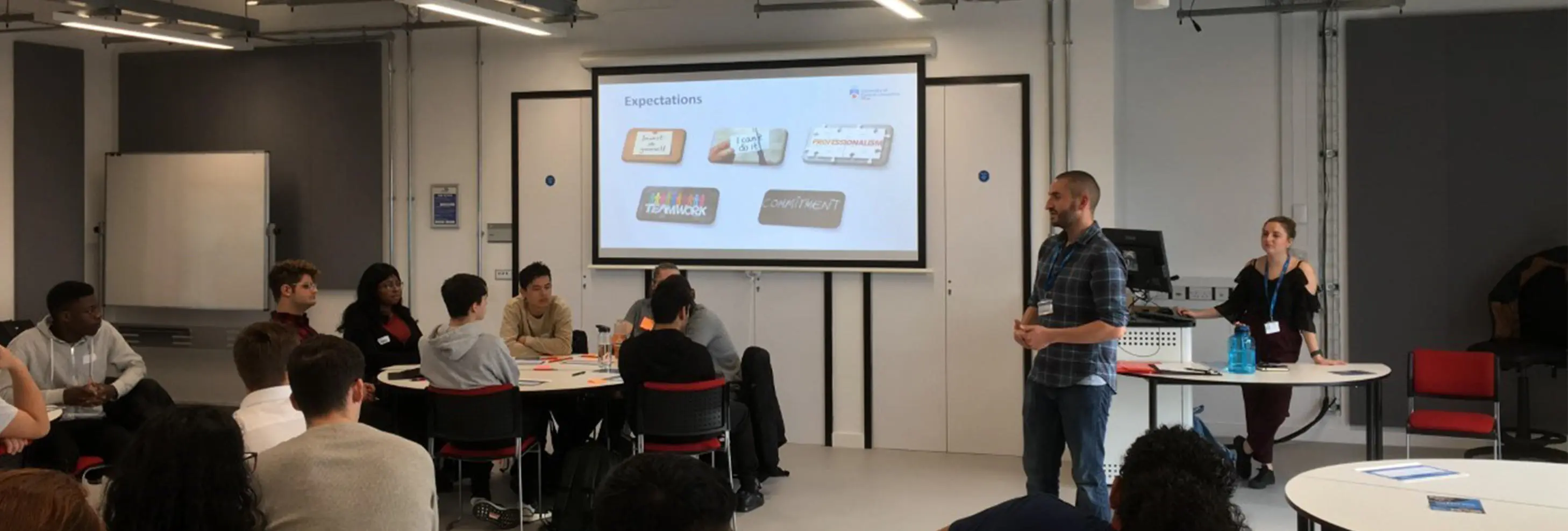UCLan receives £100,000 grant for engineering entrepreneurial scheme
The University of Central Lancashire (UCLan) has been awarded £100,000 for a creative project to increase diversity and inclusion in engineering.
The Royal Academy of Engineering’s new Diversity Impact Programme has given the largest amount of available funding to UCLan’s Entrepreneurship and Start-up for Engineers (EASE) Zone, a new 18-month extra-curricular entrepreneurship and start-up initiative for students in the School of Engineering.
The EASE Zone was developed to celebrate creativity and innovation in UCLan’s next generation of engineers, especially those from Black, Asian and Minority Ethnic (BAME) backgrounds and women.
Bringing together business start-up workshops, expert-led masterclasses, and employer challenges, including network and award celebrations, the scheme hopes to increase the number of under-represented students who transfer into the engineering profession on graduation.
Emma Speed, Director of UCLan’s Creative Innovation Zone and Enterprise, said: “It’s fantastic we’ve received this funding as it will allow us to continue the work we’ve started doing to bring together people from across engineering to help them think differently and creatively. By sharing their ideas, we really hope in the long-term they will look at becoming entrepreneurs in their own right and set up their own companies.”
"It’s fantastic we’ve received this funding as it will allow us to continue the work we’ve started doing to bring together people from across engineering to help them think differently and creatively"
— Emma Speed, Director of UCLan’s Creative Innovation Zone and Enterprise
The University is one of 11 in the UK to receive the grant through the Academy’s allocation of funding from the Department for Business, Energy and Industrial Strategy.
Partnered by the Creative Innovation Zone, Propeller and Careers, the main goal of the EASE Zone is to enable and prepare prospective engineers for the challenges of employment and showcase opportunities around them whilst being supported by UCLan academic lecturers and business professionals.
Ric Brame, Enterprise Manager at the Creative Innovation Zone, said: “The EASE projects have certainly provided students with a taste of the real world. They have demonstrated creative thinking, resilience and a good level of maturity when responding to employers’ feedback and requests. It has been a pleasure watching them grow professionally on this learning journey.”
Dr Ahmed Onsy, UCLan’s School of Engineering’s Deputy Head for Business Development and Partnerships, commented: “The EASE Zone project is aiming to increase engineering students’ employability by 10% over the next two years, through students' engagement with enterprise activities and practice of entrepreneurial skills including start-up concepts. The EASE Zone is a collaborative project that truly represents UCLan values; teams are ‘achieving together’, we are ‘creating opportunity’ for our students, and we are ‘being proud’ of ‘supporting all’ of our students.”
"The EASE Zone project is aiming to increase engineering students’ employability by 10% over the next two years"
— Dr Ahmed Onsy, UCLan’s School of Engineering’s Deputy Head for Business Development and Partnerships
There was interest from 65 students from multiple diverse backgrounds, 25% of which were women and included students from a BAME background; including individuals with multiple disabilities (both physical and learning).
Speaking of the launch, Conner McFarlane, 21, a third-year energy engineering student, said: “I feel like it’s a potential opportunity to learn more about entrepreneurship, and get more of an idea about what’s required when starting your own business, and it’s good to meet new people.”
External professional organisations that are currently working with students include Preston-based LED screen company ADI.tv and Bentley Motors Limited.
In recent weeks, participating students have been tasked with pitching practical ideas, much like on BBC’s The Apprentice, to both companies to boost their formal presentation skills. The entrepreneur masterclasses feature business etiquette, self-branding and skill workshops in presentation, CV writing and job interviews.
"The Academy’s new Diversity Impact Programme has been designed to support universities in making a step change in diversity and inclusivity across engineering Higher Education"
— Dr Hayaatun Sillem CBE, Chief Executive of the Royal Academy of Engineering
Masters design student, James Grearson, 23, who has a work placement, said he hopes the scheme will help him develop more confidence in speaking to others and give him the chance to assist people within a team framework.
Dr Hayaatun Sillem CBE, Chief Executive of the Royal Academy of Engineering, added: “The Academy’s new Diversity Impact Programme has been designed to support universities in making a step change in diversity and inclusivity across engineering Higher Education. Our goal is to help universities to develop interventions, informed by evidence, that transform the outcomes of students from diverse and underrepresented backgrounds. It is vital that we seek innovative and creative ways to accelerate the pace of change rather than accepting that incremental improvement is all that is possible.
“There is an extensive evidence base supporting the benefits of diverse teams working in inclusive cultures but there is still a way to go in understanding how to deliver the culture of inclusion that unlocks the power of diversity. These projects will give us invaluable insights and experience that will be shared across the Higher Education community so that we can work collectively to drive positive change.”
UCLan is also part of the Lancashire Local Enterprise Partnership (LEP), which formally represents several local authorities, private firms and education organisations. The LEP was originally formed in 2011, to focus on raising the business profile of Lancashire and encouraging other companies and organisations to invest in the county.
By Jack Thompson

